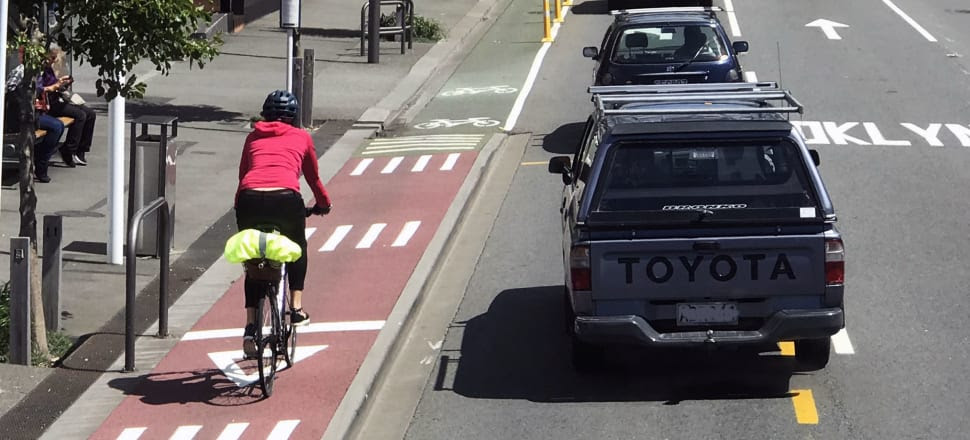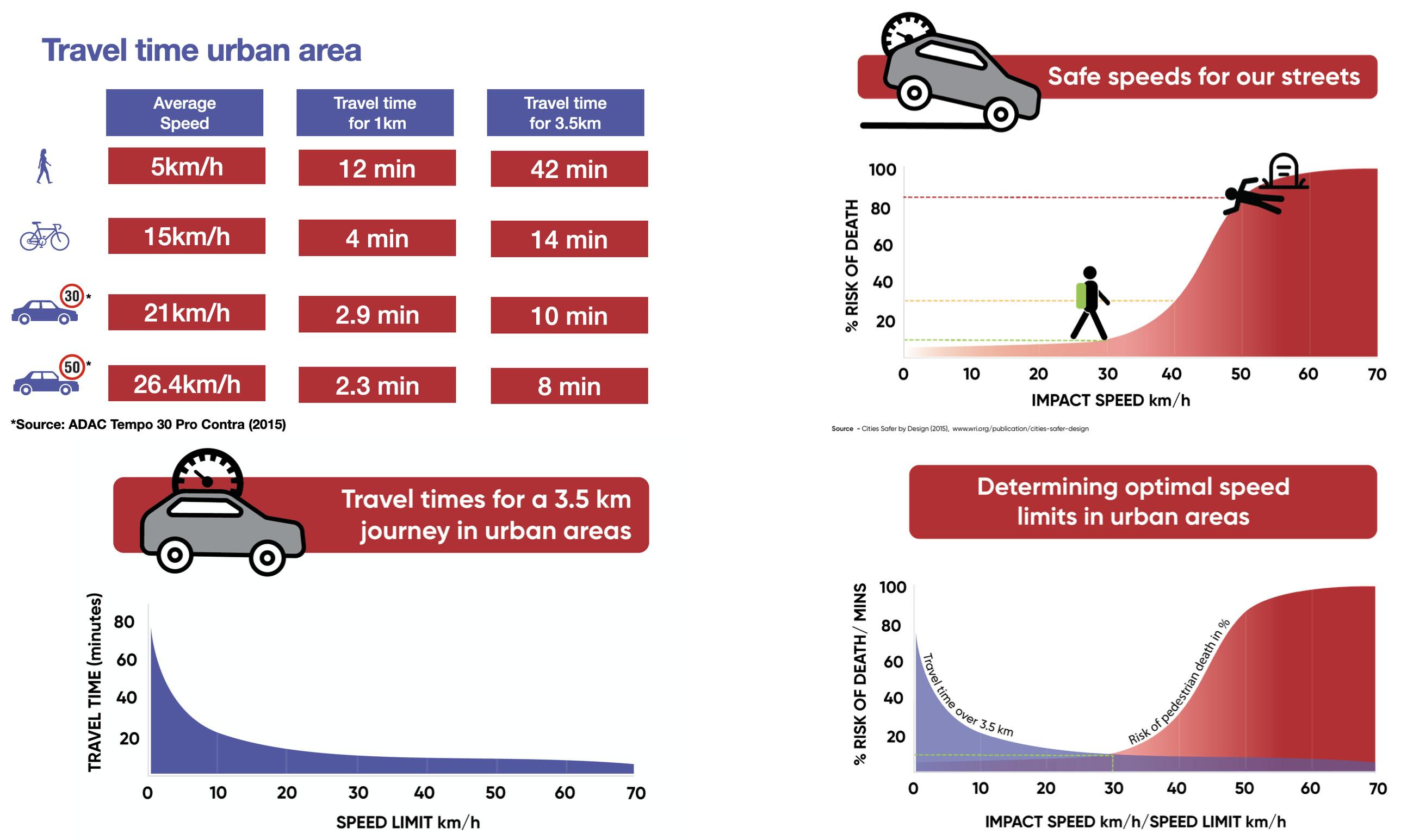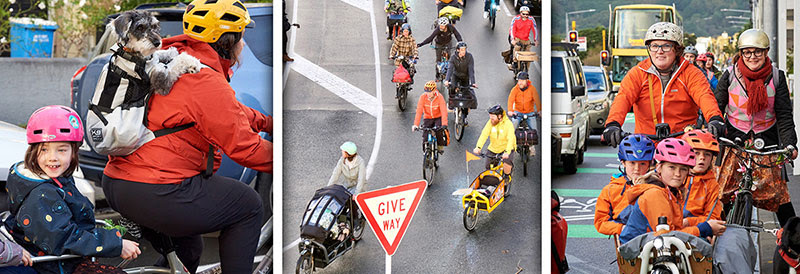Cycling provides an intoxicating sense of accomplishment
In terms of good news stories for cycling, June was a bumper month. It can be all too easy to forget to stop and take stock – we should all feel buoyed by this wider, positive coverage that many New Zealanders will be interacting with.

Caption: Junelle Robinson runs a social cycling group in Christchurch (TVNZ)
Every morning on my commute – alongside the sleepy Heathcote River, past the busy queue of cars on Colombo St, and into Christchurch city centre – I’ve made it a habit to reflect on what biking means to me, and what it can mean for others.
I find cycling instills bursts of playfulness into my day, something we lose all too readily in our everyday life. Cycling can gift us a sense of freedom, financial and otherwise, as we’re absolved of the petrol pump. Cycling provides an intoxicating sense of accomplishment – when dismounting I sometimes can’t help but say to myself, “Yup, got here just using my legs”. Is that just me?
By no means does that encapsulate all the emotions that cycling brings us. Too many of us are familiar with the anger and injustice we so rightly and passionately feel when cyclists’ safety isn’t prioritised.
At the minimum, cycling should feel like a feasible, legitimate, safe, and accessible transport and recreation option to all. But beyond that, I’m sure you all share the bigger dream of cycling being a source of excitement for more people, more often.
Dea Majstorović (she/her) is CAN's Chair.
Government to give Councils better tools to upgrade streets

Local councils will soon find it easier to remove carparks and build bike lanes, as the government plans to improve outdated and cumbersome traffic legislation. In Wellington six businesses launched a judicial review to block new bike and bus lanes. The Court will hear the case in September.
Transport Minister Michael Wood has promised progress soon on the “cumbersome” transport rules covering roads and how they can be used.
“We’re still working through the final phases of that but I would hope in the next couple of months we’ll be in a position to announce further progress there. The Emissions Reduction Plan calls for things to be made easier, including an improved consultation process and the removal of “unnecessary regulatory barriers.”
In just over 10 years the Government wants total kilometres travelled by the light vehicle fleet down by 20 percent, and a major part of that is making it easier to get around cities without a car.
CAN says: Lack of action on safety is unacceptable

Don't you hate it when someone passes you too closely? It's scary and dangerous, but somehow it's not illegal. CAN has been calling for a safe passing law for years. So we were pleased when the Government announced it would consult on a safe passing law back in March 2020, as part of the Accessible Streets package of rule changes.
Since then ... no progress. It appears this urgently-needed rule change is gummed up in the Beehive.
CAN says that's not good enough. Why are we waiting? Please help us campaign for traffic rules that protect people on bikes.
Take action: write to the Minister of Transport, Michael Wood (michael.wood@parliament.govt.nz) and let him know that you want action on a safe passing law. Ask him to change the law to make close passing illegal.
Call for bike lanes following fatal crash in Hamilton
Cyclists shouldn’t have to die before authorities recognise the need for separated and protected infrastructure for people on bikes, a cycling advocate says.
Bike Waikato chairperson Richard Porter’s comments come after the death of a woman who was riding to work in Hamilton on Monday. Jessica Jacqueline Moser, 28, was killed in a collision with a truck at the busy intersection of Tristram and London streets.
Bike Waikato Chairperson Richard Porter said the biking community wants change to come before fatalities happen, not after ... He said allocating roads specifically for other users happens around the world and in New Zealand.
Tasman walking and cycling strategy to make streets safer

Separated cycleways and 30 km/h speed limits in urban streets are part of a 30-year strategy to make Tasman roads safer and easier for pedestrians and cyclists.
Elected members on the council’s strategy and policy committee in late May adopted the strategy, which has a target of doubling the number of trips made by walking and cycling to work and school in urban areas by 2030 and tripling them by 2050.
Transportation planning officer Clare Scott described the strategy as aspirational and said it was about holistic network planning.
“We know now that designing our road networks for cars is not enough ... we need to ensure the safety of all our road users,” Scott said. “Making sure that everybody [who] wants to has the choice to walk or cycle safely and conveniently.” More here.
The case for 30 km/h on local streets

Lower speed limits have many advantages such as: fewer crashes due to shorter braking distances; increased driver awareness due to a wider field of vision; and less noise. However, the most common misunderstandings are probably the below:
Myth: They don’t make a difference to people’s safety
Speed kills is not just a marketing slogan. Humans can only tolerate a certain amount of kinetic energy before sustaining permanent injury. The kinetic energy is proportional to the square of the impact speed.
At impact speeds above 30 km/h the risk of death for a pedestrian increases dramatically. This is a causal relationship based on physics, the second law of motion. More here.
World Bicycle Day

Cycle Wellington marked World Bicycle Day on June 3 with a cargo bike parade, lunchtime picnic, and an evening rave. CW Co-chair Alex Dyer says "It was really inspiring riding bikes with families and meeting up with our wonderful supporters at three great events throughout the day."
Stuff cares about better cycling, walking, and public transport
We're encouraged to see the wonderful new focus on Mode Shift being produced by The Dominion Post at Stuff.
Anna Fifield, Editor of the Dominion Post, introduces the series:
“Having an efficient and reliable public transport system – in conjunction with a good bike network – will be great for people in cars because it will reduce congestion, making it easier for those driving, whether for work or leisure, to get around. It will also be easier to park for those who do drive into the city. This series, which will continue for all of June, is about enabling people who want to use different modes of transport to do so.” |

- For this mum and two kids, biking is freedom - By Bill Hickman
- Newtown locals on their new cycleway: 'It’s amazing, I love it.' - By Bill Hickman
- Long-term e-bike loan opens up new life of freedom for mum - By Lauren Crimp
- Mode shift will unlock Wellington's potential - By Roger Blakeley
- Happy commuters have sense of control, and two wheels, not four - By Rachel Thomas
- Why we need to limit the number of cars passing through neighbourhoods - By Simon Louisson
- Why a ride to work sets up the day for one of the Beehive's busiest ministers - By Matthew Tso
- The Dominion Post gets real on climate action - By Hayden Donnell on Mediawatch
Inspiration
Cycling Without Age comes to Napier
/cloudfront-ap-southeast-2.images.arcpublishing.com/nzme/66ZEU5M3D66NO2GLY27HUCHRRQ.jpg)
Hopping on a bike and feeling the wind in your hair is something many of us take for granted. But for some in our community, that isn't the case.
Cycling Without Age (CWA) Napier is a recently formed registered charitable trust which has imported an electric triobike from Copenhagen. Trustees Alan White and Liz Barrett spent a few months fundraising the $25,000 needed for the bike. A ride on a triobike gives senior citizens the chance to get back on a bike.
"We feel honoured to be given the privilege to give our Napier senior citizens the right to rediscover the joy of cycling and reconnecting with nature and sharing their stories as we slowly ride on their outings," Alan says. More here.
Help CAN achieve more
Don’t you hate it when they pass you too close or cut you off?
Do you want attractive and safe cycleways?
Are you shocked that only 2 percent of our kids bike to school?
Cycling Action Network is a people-powered movement for a better New Zealand. We speak up for you. We rely on you. Here's our achievements since 1997.
Donate today. With more of us, the stronger our voice. CAN needs your help to fund the work that's needed. Please contribute today.
Follow us on Twitter @CyclingActionNZ @PatrickMorgan
About Cycling Action Network
CAN is New Zealand's national network of cycling advocates. We work with government, local authorities, businesses and the community on behalf of cyclists, for a better cycling environment. can.org.nz
Greetings Patrick Morgan and thanks for supporting Cycling Action Network.
Make sure all your friends and family have joined up, and if you want to get involved, please volunteer!
